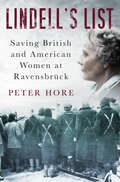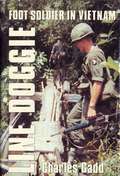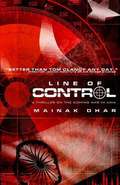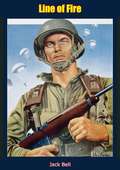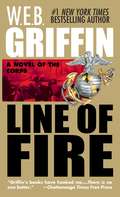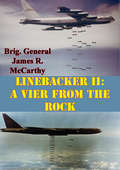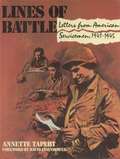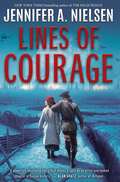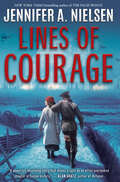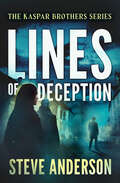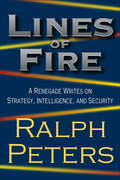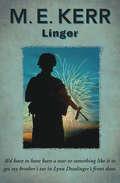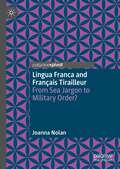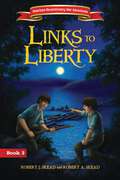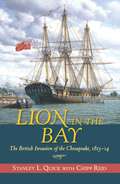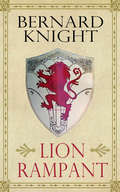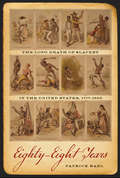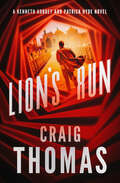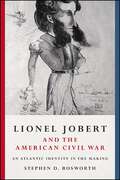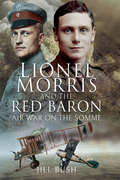- Table View
- List View
Lindell's List: Saving British and American Women at Ravensbrück
by Peter HoreAlready a decorated heroine of the First World War, British-born Mary Lindell, Comtesse de Milleville, was one of the most colourful and courageous agents of the Second World War, yet her story has almost been forgotten. Evoking the spirit of Edith Cavell, and taking the German occupation of Paris in 1940 as a personal affront, she led an escape line for patriotic Frenchmen and British soldiers. After imprisonment, escape to England, a secret return to France and another arrest, she began to witness the horrors of German-run prisons and concentration camps. In April 1945, a score of British and American women emerged from the Women’s Hell – Ravensbrück concentration camp – who had been kept alive by the willpower and the strength of one woman, Mary Lindell. She combined a passion for adventure with blunt speech and persistently displayed the greatest personal bravery in the face of great adversity. To counter German claims that they had no British or American prisoners, Mary smuggled out a plea for rescue and produced her list from her pinafore pocket, compiled in secret from the camp records. This vital list contained the names of captured women, many of whom were agents of British Military Intelligence, the Special Operations Executive or the French Resistance. Poignantly supported by first-hand testimony, Lindell’s List tells the moving story of Mary Lindell’s heroic leadership and the endurance of a group of women who defied the Nazis in the Second World War.
Line Doggie: Foot Soldier in Vietnam
by Charles GaddCharles Gadd served in Vietnam in late 1967 and 1968 and had experiences very similar to what most enlisted men endured. He describes the mud, blood, leeches, loss of friends, and low morale due to constant harassment by guerrillas. The author, a squad leader with the 101st Airborne, was wounded twice and saw nearly constant action in the Central Highlands. This memoir is a vivid and accurate description of the Vietnam War.
Line War
by Neal AsherThe Polity is under attack from a 'melded' AI entity with control of the lethal Jain technology, yet the attack seems to have no coherence. When one of Erebus's wormships kills millions on the world of Klurhammon, a high-tech agricultural world of no real tactical significance, agent Ian Cormac is sent to investigate, though he is secretly struggling to control a new ability no human being should possess . . . and beginning to question the motives of his AI masters. Further attacks and seemingly indiscriminate slaughter ensue, but only serve to bring some of the most dangerous individuals in the Polity into the war. Mr Crane, the indefatigable brass killing machine sets out for vengeance, while Orlandine, a vastly-augmented haiman who herself controls Jain technology, seeks a weapon of appalling power and finds allies from an ancient war. Meanwhile Mika, scientist and Dragon expert, is again kidnapped by that unfathomable alien entity and dragged into the heart of things: to wake the makers of Jain technology from their five-million-year slumber. But Erebus's attacks are not so indiscriminate, after all, and could very well herald the end of the Polity itself . . .
Line of Control A Thriller on the Coming War in Asia: A Thriller On The Coming War In Asia
by Mainak DharIt is 2012, and the world is a more dangerous place than ever before. Revolutions have swept aside one Middle Eastern regime after another. A regime allied to Al Qaeda has swept to power in Saudi Arabia, and uses its oil wealth and modern arsenal to further spread Jihad around the world. Yet another military coup brings a fundamentalist regime to power in Pakistan, which initiates an audacious plan to strike the first blow in this new global Jihad. As unprecedented terror attacks stun India, the stage is set for a conflict that brings the Indian subcontinent to the brink of a nuclear annihilation.
Line of Fire
by Jack BellTHE STORY OF WORLD WAR II’S LOWEST COMMON DENOMINATOR—THE FIGHTING MANOriginally published in 1948, this is the fascinating account of U.S. soldiers fighting in East Asia and Europe, as seen firsthand by an American journalist, Jack Bell of the Chicago Daily News.“Jack Bell spent his time with the fighting men, usually where the fighting was the thickest. He knew the troops and lived with them. He was the kind of a correspondent who would patrol the frontal areas, get voluminous motes, go back to his typewriter and write enough stuff to fill his requirements for a week, then go out again for another basketful of names and hometowns.“He saw and knew the war as it really was—the machine gunner sweating out the next attack; the advancing BAR man clinging closely to a stone wall; the lonely man on an outpost listening with every pore of his body; the exhilaration and excitement of intense firing and fighting and the depressing feeling that came with surveying the killed and wounded in the silence that followed. He knew all of it and much more. He knew the people that fought it, their fear, their worries, and their moments of greatness. And this, finally, is the essence of war. For it is a composite of men, gun crews, air crews, seamen, and thousands of small fighting teams, all of whom regardless of their origins and fears do their jobs when the chips are down. It is these things rather than broad arrows on bright maps with thumb smudged evidences of staff cerebrations that is war. And this was Jack Bell’s war.”—James M. Gavin
Line of Fire (Corps #5)
by W.E.B. GriffinLine of Fire brings to life a desperate mission of World War II that captures the drama and courage of the men who fought it. Two Marines, reporting on Japanese air activity, are trapped on a small Coastwatcher island. A special rescue team is assembled to save them--under enemy gunsight. It is am exciting and powerful story of real heroism that only W.E.B. Griffin could tell...
Line of Fire (Greenway Range)
by Helenkay DimonBook two of Greenway RangeWith his military career over and his ego bruised, Jason McAdams is ready to start over. As a founding partner in Greenway Range, his new life is everything he'd ever dared to dream about, but it also puts him in constant contact with the one woman he can't have: his best friend's little sister.Molly Cain has loved Jason for as long as she can remember, and seeing him now--damaged and self-destructive--is a constant heartache. Watching him numbly work his way through woman after woman is damn near intolerable. Until one summer night changes everything.After a rocky start, the sex is hot and naughty and all Molly knew it would be. And when he makes another pass at her, Molly doesn't say no. Or the many times after that, either. But Jason carries a secret--one that's kept him away from Molly for all these years, one that could ruin everything. He's been shot at and seen death, but letting the woman he loves find out the truth is the real worst-case scenario...
Linebacker II: A View From The Rock [Illustrated Edition] (USAF Southeast Asia Monograph Series #6)
by Brig. General James R. McCarthy Lt.-Col. George B. AllisonWith 30 illustrationsThis is a narrative drawn from the era of the Southeast Asian conflict, detailing a unique event in that lengthy struggle. The event was called LINEBACKER II, a nickname like thousands of others, used to identify an operation, project, or mission associated with military affairs. It so differed from the many others, however, in its execution and outcome, that it stands alone. For the first time in contemporary warfare, heavy jet bombers were employed in their designed role to conduct extended strategic operations against the warmaking capacity of a hostile nation.This monograph tells part of the story of Strategic Air Command's participation in LINEBACKER II. In so doing, it addresses the efforts of a complex mixture of Air Force and sister service operations, with all services working in concert towards a common goal. Rather than develop a complete chronology or blow-by-blow account, which are matters of record in other works, the campaign is pursued more from the personal perspective.Herein is described the impact of LINEBACKER II on those in command, plus those in operations, maintenance and support who undergirded the effort, and the crewmembers. The narrative tells how they successfully met a staggering challenge. There was no book to follow. In only eleven days of intense combat operations they wrote their own book as they supported and flew the missions.In reviewing their story we find insight as to why the nation and the military need this caliber of people, who stepped forward when the need arose, demonstrated superior leadership, determination, and resiliency, did the job, and then dispersed into the more normal patterns of life. Many have since retired or separated from active service. Yet, it is clear that the ultimate well-being of our military structure in society must hinge on the continuing presence of this breed of people. Theirs was an achievement born of great ability and courage, and deserving of great honor.
Lines of Battle: Letters from American Servicemen, 1941-1945
by Annette TapertLetters from American Servicemen 1941-1945.
Lines of Courage
by Jennifer A. NielsenJennifer A. Nielsen, award-winning author of A Night Divided and Rescue, artfully weaves together the stories of five kids living through World War I, each of whom holds the key to the others' futures... if they are lucky -- and brave -- enough to find each other. <p><p> World War I stretches its cruel fingers across Europe, where five young people, each from different backgrounds and nations, face the terror of battle, the deprivations of hunger, and all the awful challenges of war. <p><p> Felix, from Austria-Hungary, longs for the bravery to resist Jewish deportations before his own family can be taken. <p><p> Kara, from Britain, dreams of someday earning her Red Cross pin and working as a nurse -- or even a doctor. <p><p> Juliette, of France, hopes her family can remain knitted together, despite her father's imprisonment, as the war's longest battle stretches on and on. <p><p> Elsa, from Germany, hopes her homing pigeon might one day bring her a friend from out of the chaos. <p><p> And Dimitri, of Russia, wants only to survive the front, where he's been sent with no weapon. <p><p> None of them will find exactly what they want. But the winds of fate may cross their paths to give each of them just what they need. And in this remarkable exploration of World War I by critically acclaimed author Jennifer A. Nielsen, they will discover that friendship and courage can light the way through the most frightening of nights.
Lines of Courage
by Jennifer A. NielsenJennifer A. Nielsen, award-winning author of A Night Divided and Rescue, artfully weaves together the stories of five kids living through World War I, each of whom holds the key to the others' futures... if they are lucky -- and brave -- enough to find each other."A powerful, absorbing story that shines a light on an often overlooked chapter in human history." -- Alan Gratz, #1 New York Times bestselling author of RefugeeWorld War I stretches its cruel fingers across Europe, where five young people, each from different backgrounds and nations, face the terror of battle, the deprivations of hunger, and all the awful challenges of war.Felix, from Austria-Hungary, longs for the bravery to resist Jewish deportations before his own family can be taken.Kara, from Britain, dreams of someday earning her Red Cross pin and working as a nurse -- or even a doctor.Juliette, of France, hopes her family can remain knitted together, despite her father's imprisonment, as the war's longest battle stretches on and on.Elsa, from Germany, hopes her homing pigeon might one day bring her a friend from out of the chaos.And Dimitri, of Russia, wants only to survive the front, where he's been sent with no weapon.None of them will find exactly what they want. But the winds of fate may cross their paths to give each of them just what they need. And in this remarkable exploration of World War I by critically acclaimed author Jennifer A. Nielsen, they will discover that friendship and courage can light the way through the most frightening of nights.
Lines of Deception (The Kaspar Brothers)
by Steve AndersonA West German nightclub owner goes behind the Iron Curtain on a desperate mission to save his brother, in this Cold War thriller by the author of Lost Kin.West Germany, 1949. Former actor Max Kaspar suffered greatly in the Second World War. Now he owns a nightclub in Munich—and occasionally lends a hand to the newly formed CIA. Meanwhile, his brother Harry has ventured beyond the Iron Curtain to rescue an American scientist. When Harry is also taken captive, Max resolves to locate his brother at all costs. The last thing he expects is for Harry to go rogue. Max&’s treacherous quest takes him to Vienna and Prague to Soviet East Germany and Communist Poland. Along the way, dangerous operators from Harry&’s past join the pursuit: his former lover Katarina, who&’s working for the Israelis, and former Nazi Hartmut Dietz, now an agent of East German intelligence. But can anyone be trusted? Even the American scientist Stanley Samaras may not be the hero Harry had believed him to be . . .
Lines of Fire: A Renegade Writes on Strategy, Intelligence, and Security
by Ralph PetersThe New York Times–bestselling military analyst offers a collection of essays covering a generation of geopolitics and military policy. For decades, Ralph Peters has been the most provocative and visionary American writer on military affairs, strategy, security, and intelligence. In that time, he predicted every major trend that has plagued the post-Cold-War world. A career military officer and acclaimed author, he has faced issues ranging from the explosion of religious terrorism to the fatal weaknesses of our intelligence system and our dangerous over-reliance on technology. Now Peters delves into these and other enduringly vital themes in this definitive, career-spanning collection of his writings. Lines of Fire is an indispensable volume for understanding today&’s crises—and tomorrow&’s.
Linger
by M. E. KerrIn this novel by the award-winning author of Gentlehands and Slap Your Sides, a teenager starts to look at life differently when his older brother is sent to the Persian GulfTo sixteen-year-old Gary Peel, Linger is home. His father is manager of the Pennsylvania restaurant; his mom takes care of the books; and Gary's older brother, Bobby, works there as a waiter. That is, until he decides to join the army.The only one from their hometown to enlist, Bobby becomes an instant hero. At Linger, Gary takes Bobby's place waiting tables--and finds himself drawn into the correspondence between his brother and Lynn Dunlinger, the beautiful, preppy daughter of the restaurant's owner. The tone of Bobby's letters starts to change when he's suddenly shipped overseas. Gary--the brother left behind--tries to adjust to his new life and prepares for the first Christmas without Bobby.Set during the Gulf War crisis and featuring a diverse cast of characters, Linger interweaves Gary's first-person narrative with Bobby's letters and journal entries from Saudi Arabia in a multifaceted look at bigotry, power, and the valor under fire that can drive ordinary people to commit extraordinary acts. This ebook features an illustrated personal history of M. E. Kerr including rare images from the author's collection.
Lingua Franca and Français Tirailleur: From Sea Jargon to Military Order?
by Joanna NolanThis book explores how the eponymous and original Lingua Franca was recognized as a potential linguistic template for future military and colonial pidgins. The author traces the career trajectory of General Louis Faidherbe, a member of the French colonizing force in Algiers in the early 1830s and a recognized linguist, who rose up through the ranks in various African colonies and was the founder of regiments in West Africa, including the Senegal-based tirailleurs. Their artificially constructed military pidgin, Français Tirailleur, was a language modelled on the reduced grammar and lexicon of Lingua Franca. This book demonstrates the direct link between the two languages, as well as connections with other colonial pidgins in Asia that also derived to some extent from Lingua Franca. It will be of interest to students and scholars of language contact and language history, pidgins and creoles, and military and colonial history.
Links to Liberty (American Revolutionary War Adventures)
by Robert J. SkeadIn book three of the American Revolutionary War Adventures historical fiction series, readers ages 8-12 can experience the Revolutionary War firsthand in this novel based on actual events. Sixteen-year-old twins Ambrose and John Clark, who have helped the fight for freedom by assisting their father and even accomplishing a mission for George Washington himself are faced with more dangerous challenges. Now the boys must work together with bravery and courage to help the cause of independence.In addition to bringing alive America&’s war for independence, Links to Liberty:Teaches kids about the Revolutionary War from a kid&’s perspectiveIs packed with historical information that is entertaining and educationalContains discussion questions, backgrounds on the real-life historical persons featured in the book, and historical lettersCan be used alongside school curriculum and as a homeschool resource In this third adventure, the brothers search to find the traitor who has put their father and brother as well as the cause of independence in jeopardy. As they bravely, and sometimes impetuously search for the culprit, hoping to make him pay, they must also make a life-changing decision—to follow Major Tallmadge&’s lead and train as Dragoon&’s in the Continental Army or accept scholarships to Yale, leaving behind the danger of war and spy intrigue.
Lion In The Bay: The British Invasion Of The Chesapeake, 1813-14
by Chipp Reid Stanley L. QuickThis is the story of the War of 1812 like no other, brought to life in narrative form with pinpoint historical details. As the War of 1812 raged on the high seas and along the Canadian border, the British decided to strike at the heart of the United States, the relatively undefended area of the Chesapeake Bay. The Chesapeake was a fertile farm region, a renowned place of shipbuilding and an area divided along political lines over the war. Admiral George Cockburn led the British into the bay in March 1813. After a failed attempt to take Norfolk, Cockburn led the British up and down the Chesapeake. Originally a campaign to relieve pressure from other fronts, the Chesapeake theater soon became a campaign of retribution for the British, turning what had been an economic engine for America into a region of terrorized citizens, destroyed farms and fears of slave insurrection. The blockade choked American commerce and prevented privateers from taking the war to the English. Cockburn returned in 1814 and once more terrorized the residents on both shores of the Chesapeake while stoking the political divisions that also rent the country. In August, 1814, the British capitalized on the refusal of President James Madison to bolster the defenses of the waterway that led to the nation’s capital. Cockburn again led a naval force into the bay, but this time he ran into opposition from Commodore Joshua Barney and his polyglot flotilla of warships. Barney put up an heroic though doomed fight before the British landed at Benedict, Md. , in August, 1814 and marched on Washington, D. C. After defeating the Americans at Bladensburg, the British burned Washington before returning to their boats and setting out for Baltimore. There, the British armada ran into Fort McHenry and a stalwart group of defenders. Despite a massive bombardment, the British could not silence the fort or the city’s other defenses, forcing them to retreat and give up their campaign to completely shut the Chesapeake. The victory at Baltimore, coupled with victories on the Great Lakes, helped turn the war in America’s favor.
Lion Rampant
by Bernard KnightA historical epic by Bernard Knight, Lion Rampant is set in medieval Wales and features the tale of Nest, a princess known as 'the Welsh Helen of Troy'. Nest was a lover of King Henry I of England, married the steward of a Pembrokeshire castle (giving rise to the FitzStephen and FitzGerald families, including Gerald of Wales), and was later abducted by a marauding Welsh noble. This is the story of the adventure, intrigue, and warfare in the various kingdoms of Wales during the twelfth century.
Lion Rampant
by Bernard KnightA historical epic by Bernard Knight, Lion Rampant is set in medieval Wales and features the tale of Nest, a princess known as 'the Welsh Helen of Troy'. Nest was a lover of King Henry I of England, married the steward of a Pembrokeshire castle (giving rise to the FitzStephen and FitzGerald families, including Gerald of Wales), and was later abducted by a marauding Welsh noble. This is the story of the adventure, intrigue, and warfare in the various kingdoms of Wales during the twelfth century.
Lion Rampant - Medieval Wargaming Rules
by Mark Stacey Daniel MerseyLion Rampant is a set of rules designed for fighting historical or Hollywood battles in the medieval period from the Norman Conquest to the Hundred Years' War. This period is well suited to large skirmish gaming as played with Lion Rampant as it was a time of anarchy, feuds, robbery, and raiding. Become Robin Hood, Richard the Lionheart, Gamelyn, William Wallace, Llewellyn the Last, or other legends and leaders from the colorful, dangerous medieval period. Lion Rampant is ideal for players who wish to collect medieval miniatures without wanting to muster huge forces or spend time learning complex rules.Gameplay is very simple, and requires the player to use units in the correct tactical way: knights are great at charging down enemies but less useful for guarding convoys, while spearmen are jacks of all trades and masters of none, and bowmen are to be feared at distance but easily cut down if you can get close enough. An army usually consists of 6-8 units comprised of 6-12 individually based figures (making it ideal for 15mm or 28mm games), and is led by a Leader, who may have some unique character traits that affect game play and provide some opportunity for role playing. The action, however, focuses very much on the small units involved in the battle rather than individual characters: each unit moves and fights independently, assuming that they follow your orders rather than just doing their own thing. Command and control is just as important on the battlefield as the power of a mounted knight.Some army lists are provided, and guidance given for players seeking to create their own forces, but this game is not army list-heavy. The rules include a good number of scenarios, which are important to this style of gaming.
Lion's Run (The Kenneth Aubrey & Patrick Hyde Series)
by Craig ThomasNew York Times–Bestselling Author: A British spy goes into action when his boss is framed for treason in this &“bracing thriller . . . the suspense is galvanizing&” (The Wall Street Journal). After baiting Kenneth Aubrey with a potential defector, the KGB gets their hooks in by framing Aubrey himself as a traitor—and a killer. Now the head of British intelligence is enduring house arrest and interrogation, and things look bleak. His field agent, Patrick Hyde, is convinced someone within their own ranks must have conspired with the KGB to destroy the long-serving spymaster—and his quest to uncover the double agent will take him from Afghanistan to Czechoslovakia and into a top-secret computer system . . . &“A cloak-and-dagger grand tour . . . When it comes to keeping the story moving and stoking up the excitement, Mr. Thomas knows his business.&” —The New York Times
Lionel Jobert and the American Civil War: An Atlantic Identity in the Making
by Stephen D. BosworthMillions of soldiers and civilians passionately supported one side or the other in the American Civil War. For Colonel Lionel Jobert d'Epineuil of the Fifty-Third New York Volunteer Regiment, however, his own advancement mattered more than the outcome of the conflict. This biography analyzes the remarkable exploits of a man driven by ambition—and unhindered by scruples—to attain position and prestige in the Atlantic region during the second half of the nineteenth century.Lionel Jobert (1829–1881) was born in France, but is described as having an Atlantic identity. A ship captain by trade, Jobert exploited unstable governmental conditions in Haiti and the United States to pursue his private interests. Drawing on previously unused sources, Stephen D. Bosworth allows us to view the Civil War from the perspective of a foreign participant whose life constitutes one colorful tile in the vast mosaic that makes up the history of the nineteenth-century Atlantic.
Lionel Morris and the Red Baron: Air War on the Somme
by Jill BushA biography of the young, London-born, World War I pilot who was the first to be shot down by the legendary Red Baron. Nineteen-year-old Lionel Morris left the infantry for the wood and wires of the Royal Flying Corps on the Western Front in 1916, joining one of the world&’s first fighter units alongside the great ace Albert Ball. Learning on the job, in dangerously unpredictable machines, Morris came of age as a combat pilot on the first day of the Battle of the Somme, as the R.F.C. was winning a bloody struggle for admiralty of the air. As summer faded to autumn and the skies over Bapaume filled with increasing numbers of enemy aircraft, the tide turned. On 17 September 1916, Morris&’s squadron was attacked by a lethally efficient German unit, including an unknown pilot called Manfred von Richthofen. As the shock waves spread from the empty hangars of No.11 Squadron all the way to the very top of the British Army, the circumstances surrounding Morris&’s death marked a pivotal shift in the aerial war, and the birth of its greatest legend. Told through previously unpublished archive material, the words of contemporaries, and official records, Lionel Morris and the Red Baron traces a short but extraordinary life and reveals how Morris&’s role in history was rediscovered one hundred years after his death. Praise for Lionel Morris and the Red Baron &“The best written World War I aviation history account this reviewer has read in some time . . . has earned the highest recommendation.&” —Over the Front &“This is a book that deserves to be read.&” —The Aviation Historian
Lionel Robbins
by Susan HowsonBy the time of his death the English economist Lionel Robbins (1898-1984) was celebrated as a 'renaissance man'. He made major contributions to his own academic discipline and applied his skills as an economist not only to practical problems of economic policy - with conspicuous success when he served as head of the economists advising the wartime coalition government of Winston Churchill in 1940-45 - and of higher education - the 'Robbins Report' of 1963 - but also to the administration of the visual and performing arts that he loved deeply. He was devoted to the London School of Economics, from his time as an undergraduate following active service as an artillery officer on the Western Front in 1917-18, through his years as Professor of Economics (1929-62), and his stint as chairman of the governors during the 'troubles' of the late 1960s. This comprehensive biography, based on his personal and professional correspondence and other papers, covers all these many and varied activities.
Lionheart: A rip-roaring epic novel of one of history’s greatest warriors by the Sunday Times bestselling author
by Ben KaneREBEL. LEADER. BROTHER. KING.1179. Henry II is King of England, Wales, Ireland, Normandy, Brittany and Aquitaine. The House of Plantagenet reigns supreme.But there is unrest in Henry's house. Not for the first time, his family talks of rebellion.Ferdia - an Irish nobleman taken captive during the conquest of his homeland - saves the life of Richard, the king's son. In reward for his bravery, he is made squire to Richard, who is already a renowned warrior.Crossing the English Channel, the two are plunged into a campaign to crush rebels in Aquitaine. The bloody battles and gruelling sieges which followed would earn Richard the legendary name of Lionheart.But Richard's older brother, Henry, is infuriated by his sibling's newfound fame. Soon it becomes clear that the biggest threat to Richard's life may not be rebel or French armies, but his own family...'A rip-roaring epic, filled with arrows and spattered with blood. Gird yourself with mail when you start.' Paul Finch'Ben's deeply authoritative depiction of the time is delivered in a deft manner.' Simon Scarrow
